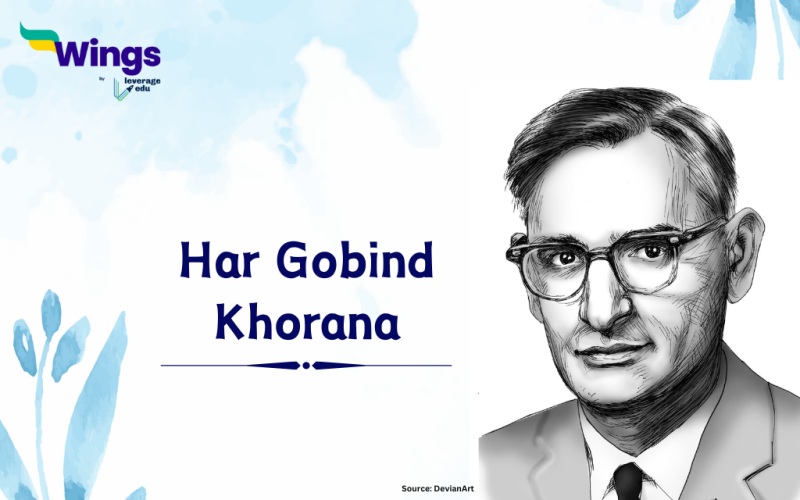Har Gobind Khorana was an Indian-American biochemist who made groundbreaking contributions to our knowledge of genetics. Moreover, his research on the role of nucleotides in protein synthesis revealed a necessary secret of the cell’s machinery. Therefore, he laid the foundation for advancements in modern medicine and biotechnology. Khorana’s work got him the Nobel Prize in Medicine in 1968. Read on to learn more about Har Gobind Khorana.
Table of Contents [show]
| Overview of Har Gobind Khorana | |
| Date of Birth | 9th of January, 1922 |
| Place of Birth | Raipur, Punjab Province which is now in Pakistan |
| Education | Government College, Lahore |
| Punjab University | |
| University of Liverpool | |
| Field | Molecular Biology |
| Spouse | Esther Elizabeth Sibler |
| Death | 9th of November, 2011 in Massachusetts, USA |
Biography of Har Gobind Khorana
Furthermore, Khorana’s upbringing and passion for research in biology helped him win many awards and accolades.
What was the Early Life and Education of Har Gobind Khorana?
Har Gobind Khorana was born on the 9th of January 1922, in Raipur, a village in British India which is now part of Pakistan.
- Moreover, he was the youngest of five children in a middle-class family.
- Khorana’s mother, Krishna Devi was a homemaker and his father, Ganpat Rai Khorana was a patwari, a village clerk responsible for agricultural taxes.
- Even though they were not that well-to-do, his family instilled in him a strong work ethic and a thirst for knowledge.
- Additionally, Khorana did very well in his studies in the village school and then later at Government College Lahore.
- He got his bachelor’s degree in science from the Punjab University in Lahore in 1943.
- Furthermore, his academic achievements were recognised with scholarships that allowed him to go through with further education.
Har Gobind Khorana: Career
In 1945, Khorana went to England to pursue a PhD in organic chemistry at the University of Liverpool. Moreover, after he completed his doctorate in 1948, he had a strong inclination towards research.
- Khorana’s interest then turned towards the growing field of biochemistry.
- In 1951, at the University of Cambridge, he got a fellowship opportunity.
- He worked under the guidance of Nobel Laureate Sir Alexander Todd.
- Thereafter, Khorana began deep learning about nucleic acids which are the building blocks of DNA and RNA.
- Khorana’s research was on the role of nucleotides in protein synthesis which is the process by which cells create proteins necessary for life.
- Then, scientists knew that DNA somehow instructed the production of proteins, but the details of this process remained a puzzle.

- Therefore, Khorana’s thorough work with enzymes and synthetic techniques helped crack the genetic code.
- He was able to synthesize specific sequences of nucleotides and observe their impact on protein formation.
- Thus, his research revealed the relationship between the order of nucleotides in DNA and the sequence of amino acids that make up proteins.
- In the 1960s, Khorana collaborated with other scientists like Robert W. Holley and Marshall Nirenberg.
- Hence, their efforts led to a complete understanding of the genetic code which is a fundamental principle of biology.
After his Nobel Prize in 1968, Khorana continued his career at the Massachusetts Institute of Technology (MIT) before returning to the University of Wisconsin-Madison. Moreover, he was still involved in research till he passed away in 2011.
Also Read: Who Is Mirza Ghalib?
Honours and Awards of Har Gobind Khorana
Additionally, here are the honours and awards that Har Gobind Khorana received throughout his life.
| Honours and Awards of Har Gobind Khorana | ||
| Year | Honour/Award | Description |
| 1966 | Member | United States National Academy of Sciences |
| 1967 | Member | American Academy of Arts and Sciences |
| 1969 | Padma Vibhushan | Government of India |
| 1969 | Louisa Gross Horwitz Prize | Columbia University |
| 1971 | Lasker Foundation Award for Basic Medical Research | Lasker Foundation |
| 1973 | Member | American Philosophical Society |
| 1974 | Willard Gibbs Medal | Chicago Section of the American Chemical Society |
| 1978 | Foreign Member (ForMemRS) | Royal Society |
| 1980 | Gairdner Foundation Annual Award | Gairdner Foundation |
| 1987 | Paul Kayser International Award of Merit in Retina Research | |
| 2007 | Khorana Program established | Department of Biotechnology (Government of India), University of Wisconsin–Madison, Wisconsin–India Science and Technology Exchange Program (WINStep Forward/WSF), and the Indo-US Science and Technology Forum |
| 2009 | Honoured at the 33rd Steenbock Symposium | Khorana Program, Madison, Wisconsin |
| 2018 | Google Doodle | Celebrated his achievements on his 96th birthday |
FAQs
Har Gobind Khorana discovered a way to decipher the genetic code. He synthesised RNA chains and used them to understand how the sequence of nucleotides dictates the amino acid sequence in proteins.
Har Gobind Khorana shared the 1968 Nobel Prize in Medicine for his contribution to interpreting the genetic code and its function in protein synthesis.
Har Gobind Khorana is the father of artificial genetics.
Relevant Blogs
This was all about Har Gobind Khorana. If you want to know more about other Famous Personalities then visit our General Knowledge page!
 One app for all your study abroad needs
One app for all your study abroad needs















 45,000+ students trusted us with their dreams. Take the first step today!
45,000+ students trusted us with their dreams. Take the first step today!
